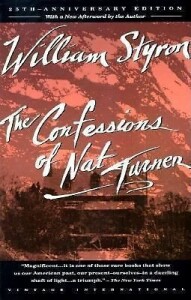
As the title suggests, this 1967 novel about the slave revolt of 1831 is told in the first person by Nat Turner, leader of the revolt. It starts with Nat in jail, chained hand, foot and neck. In meetings with his White lawyer, Nat dictates his confession, and we learn something of what sent him on this mission to kill as many White people as possible. But we need his whole life to get past the surface and truly feel what motivated him.
Nat’s life, brilliantly written, is a litany of injustice and often cruelty. Some of his owners treated him well, some viciously. He has joys and pleasures too: his friendships with some of the other slaves, his study of the Bible, his deep satisfaction in his carpentry work.
While reading, I was fully immersed in Nat’s consciousness, yet at the same time swept by my own horror and grief and shame. None of it was a surprise—I’ve seen, heard, read too much for that—but the effects of continual trauma brought to life like this affected me deeply.
Having grown up in the Tidewater area of Virginia during the Jim Crow years, Styron had been interested in the story of Nat Turner since childhood and “haunted by the idea of slavery.” His good friend James Baldwin encouraged him to write this story and to do it by taking on the persona of the protagonist.
Nat Turner has usually been presented as a fanatical madman, and apparently he truly did fast obsessively, see visions, and believe that he had been divinely appointed to this mission. Styron’s great achievement is to give us a credible and relatable individual within the confines of those facts. Two other recorded facts gave him some clues: Of the fifty-five White people killed in the revolt, Nat Turner himself only killed one, near the end, and the revolt “ran out of speed” after that.
Those facts indicate a moral consciousness at war with Nat’s mission. Throughout the book wee are in his head, thinking his thoughts, and he is always presented as rational and intelligent. By letting the reader merge into his life, taking each step with him, the author makes Nat’s actions seem reasonable, almost inevitable. Also, Nat’s thoughts are sprinkled with verses from the Bible which is his only reading material, verses which reinforce his decisions.
A third way this feat of characterisation is accomplished is by finding common ground between our experiences and his. Often Nat’s thoughts reflect insights that seem familiar to me, such as this one:
Does it seem a hopeless paradox that the less toilsome became the circumstances of my life the more I ached to escape it? That the more tolerable and human white people became in their dealings with me the keener was my passion to destroy them?
It took Styron five years to research and write the book. With little hard information to go on—the actual 7,000-word document produced by that lawyer being the only meaningful record of Nat’s life and thoughts—the author had to imagine himself into the mind and soul of a slave in antebellum Virginia. His intentions were good: he wanted to “fashion . . . an imagined microcosm of the baleful institution has persisted into this century and become the nation’s central obsession.” The book quickly became a bestseller and a Book-of-the-Month pick.
Yet only a few years later it was denounced as racist by a group of Black writers. I’ve not read their book yet and am not qualified to say one way or the other. What I do know is that it is no surprise that a book about the experience of slavery by a prominent White author would be considered proof of the privilege awarded to White voices by the publishing world.
Having already read many books about slavery, Jim Crow, and today’s injustices by Black authors, having grown up myself in a racially segregated time and place, I’m grateful to have this story too. It deepens my understanding of the early 1960s, when it seemed to me that things would never change. In some ways, sadly, they haven’t.
One thing I didn’t know before reading this book and the author’s Afterword is that in 1831 Virginia was poised to abolish slavery in the state, but Nat Turner’s revolt put an end to that. As Styron says, “the impact on the future (especially in terms of the possible avoidance of events leading to the Civil War) is awesome to contemplate.”
At this moment in time, when our democracy seems at a tipping point into destruction, largely because of deeply engrained racism, it’s daunting to consider how much can turn on a single event.
What novel have you read that gave you new insight into an historical event?